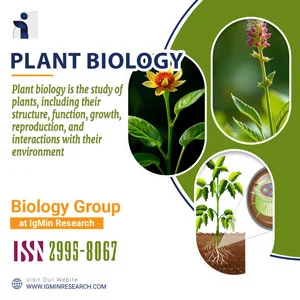Open Access Policy refers to a set of principles and guidelines aimed at providing unrestricted access to scholarly research and literature. It promotes the free availability and unrestricted use of research outputs, enabling researchers, students, and the general public to access, read, download, and distribute scholarly articles without financial or legal barriers. In this response, I will provide you with an overview of the history and latest resolutions related to Open Access Policy.
About
Advance Your Discoveries in Plant Biology with IgMin Research
IgMin Research invites researchers to contribute groundbreaking work to our Plant Biology section. Whether you're decoding plant genetics, studying photosynthesis, or exploring plant-environment interactions, we welcome your submissions in this fast-evolving domain.
Our plant biology open-access journals ensure your research reaches a global audience while upholding rigorous peer-review standards. If you're ready to submit plant science research, our platform offers visibility, credibility, and speed.
Key Features:
Quick Submission Portal: Submit your paper in minutes using our streamlined interface.
Manuscript Guidelines: Prepare your manuscript to match our formatting and review criteria.
Submit Your Research: Start your plant biology journal submission today through our official platform.
Publish with IgMin Research and be part of a global network of plant scientists contributing to agricultural innovation, sustainability, and environmental science.
Editors
Biology Group (5)
Open Access Policy refers to a set of principles and guidelines aimed at providing unrestricted access to scholarly research and literature. It promotes the free availability and unrestricted use of research outputs, enabling researchers, students, and the general public to access, read, download, and distribute scholarly articles without financial or legal barriers. In this response, I will provide you with an overview of the history and latest resolutions related to Open Access Policy.
Open Access Policy refers to a set of principles and guidelines aimed at providing unrestricted access to scholarly research and literature. It promotes the free availability and unrestricted use of research outputs, enabling researchers, students, and the general public to access, read, download, and distribute scholarly articles without financial or legal barriers. In this response, I will provide you with an overview of the history and latest resolutions related to Open Access Policy.
Open Access Policy refers to a set of principles and guidelines aimed at providing unrestricted access to scholarly research and literature. It promotes the free availability and unrestricted use of research outputs, enabling researchers, students, and the general public to access, read, download, and distribute scholarly articles without financial or legal barriers. In this response, I will provide you with an overview of the history and latest resolutions related to Open Access Policy.
Open Access Policy refers to a set of principles and guidelines aimed at providing unrestricted access to scholarly research and literature. It promotes the free availability and unrestricted use of research outputs, enabling researchers, students, and the general public to access, read, download, and distribute scholarly articles without financial or legal barriers. In this response, I will provide you with an overview of the history and latest resolutions related to Open Access Policy.

Why publish with us?
Global Visibility – Indexed in major databases
Fast Peer Review – Decision within 14–21 days
Open Access – Maximize readership and citation
Multidisciplinary Scope – Biology, Medicine and Engineering
Editorial Board Excellence – Global experts involved
University Library Indexing – Via OCLC
Permanent Archiving – CrossRef DOI
APC – Affordable APCs with discounts
Citation – High Citation Potential
Which articles are now trending?
Research Articles
- Comparing Forecasting Models for Predicting Infant Mortality: VECM vs. VAR and BVAR Specifications
- Assessment of Thermal Uniformity of Heating Plates Using a Thermal Imaging Camera
- Development of a Mechanical Seal Closed Design Model
- Challenge and Readiness to Implemented Geothermal Energy in Indonesia
- Evaluating Digital Imaging Technologies for Anogenital Injury Documentation in Sexual Assault Cases
- Gaussian-Transform for the Dirac Wave Function and its Application to the Multicenter Molecular Integral Over Dirac Wave Functions for Solving the Molecular Matrix Dirac Equation
Advertisement
















